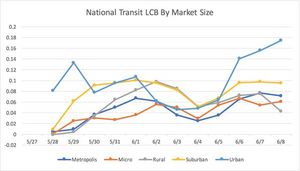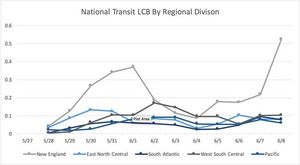WASHINGTON, DC--(Marketwired - Jul 12, 2017) - AlphaVu, the leader in social listening, data mining, and public opinion research in the transit and infrastructure industries, today introduced National Transit LCB™, a comprehensive metric designed to provide leaders with real-time, actionable insight into public opinion around public transportation safety, operations, and capital construction projects. The National Transit LCB™ is the first in a portfolio of metrics that will be released over the summer of 2017 covering ports, airports, electricity, water, and pipeline infrastructure.
AlphaVu's National Transit LCB™ metric measures the frequency of individuals' engagement on social media with transit agencies across the country and combines that data with audience sentiment, relative to a defined list of specific topics. The National Transit LCB™ can be segmented by a wide range of adjustable variables, including region, industry, market size, and financing.
"Transit agencies, construction companies, project management firms, and private equity firms need actionable data on how the public perceives transportation infrastructure. The National Transit LCB™ gives them an immediate window into public opinion so they can form the best strategies to build, finance, and manage America's bus and rail systems," said Scott Wilkinson, President of AlphaVu.
Traditional public opinion polling still relies heavily on phone surveys and other outdated methodologies that are ill-suited to today's digital age. By contrast, AlphaVu's LCB measures the conversation right where it's happening and among those most heavily involved, using proprietary algorithms to synthesize vast amounts of data from social media and digital channels. When cross-referenced with voter rolls, Census data, and other third party data sets, the result is a granular portrait of public opinion that far exceeds the traditional polls in depth, detail, and scale.
The LCB adds a critical new feature to AlphaVu's expanding toolset. From this consolidated metric, AlphaVu can dig deeper into the specific drivers of public sentiment all the way down to the individual influencers shaping the conversation in individual communities across the country.
To learn more about the LCB, please visit AlphaVu.com
About AlphaVu LLC
AlphaVu LLC is a Washington, D.C. based company with proprietary data systems and algorithms helping corporate, issue advocacy, public infrastructure organizations, trade associations, and members of Congress know exactly what chatter is important, what opportunities are emerging and who can help push agendas forward. AlphaVu's real-world understanding of how people communicate and share information empowers its clients deliver more effective and unifying messaging, giving them the edge to succeed in today's data age.
Contact Information:
Media Contact
Alex Wolf
Fog City Communications for AlphaVu
alex@fogcity.media

